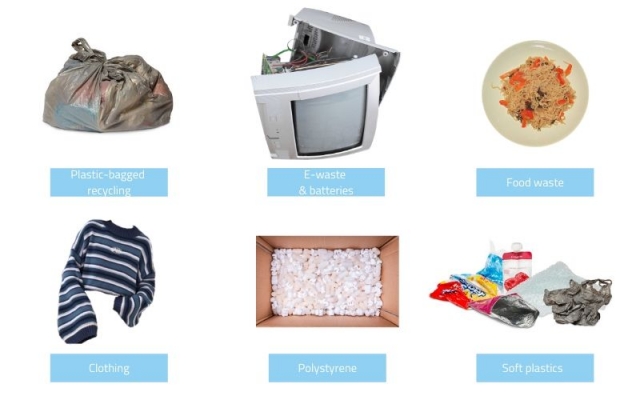Recycle bins continue to be contaminated throughout Australia. It’s important to keep these 6 things out of your recycling bin.
Two things might happen if you put wrong items into your recycling bin.
a) Items that would normally be recycled, end up in landfill.
b) Hazardous waste such as batteries or other electronic waste may cause a fire inside of the collection truck or material recovery facility.
“In 2014-15, WA’s recycling rate was 48%, which is lower than in other mainland states.” ~ Marcus Geisler
So please take time to get to know your local council’s recycling rules and keep the following items out of your yellow-top bins at all times.
And if in doubt, leave it out.
1) Electronic waste (E-waste)
No electronic waste should be put into your recycling bin. That means no battery, no mobile phones, no laptops and so on. Not even your cables and lightbulbs!
Basically anything with a plug or battery has to stay out. These items can be taken to your nearest drop-off point which could mean your local Officeworks or recycling centre.
As mentioned above, battery containing e-waste has the potential to cause a fire which not only imposes danger to drivers and recycling facility workers. Dumping electronics items into a red lidded bin also means all precious materials we spent energy and resources digging out of the ground are buried in landfill and lost for good. Some e-waste also contains heavy metals which can potentially contaminate the soil and groundwater sources, which is one of the reasons other states have banned it from landfill (Still waiting in WA! You can sign a petition here.)
2) Plastic-bagged items for recycling
The number one rule for your recyclables in the recycling bin is to keep them DRY and keep them LOOSE.
If your things are wrapped in a plastic bag, you can bet those items inside will end up in landfill. The first level of sorting at recycling stations is done by hand. Since it’s too dangerous and time-consuming for workers at recycling stations to open and sort the bags, these have to be removed from the recycling stream and thrown into the rubbish, which is destined for landfill.
3) Soft plastic aka “scrunchies”
Which brings us to the plastic bag itself. No soft plastics should go into your yellow-top. The easy rule to follow is: If you can easily scrunch it in your hand, keep it out of your recycling bin.
You can recycle soft plastics such as bread and chips bags and all other plastic bags at a REDcycle soft plastics drop off point at participating supermarkets.
As with any recycling, ensure your plastic is dry and as empty as possible.
4) Food waste
Food scraps don’t go in your recycling bin. Unless you’re fortunate to live in one of the councils that already has the food organic bin aka FOGO (the third bin with a bright green lid), food scraps belong to the general waste (red lid) bin.
To best dispose of your food waste, we recommend learning how to start a compost or downloading app such as ShareWaste which helps you find your composting neighbour.
5) Clothing
Don’t put your clothes and shoes in your recycling bin. Clothes can get stuck in the sorting machines and make it harder for other items to get recycled.
The best way to give your clothes a second life is to donate them to charity for reuse. If your clothes are no longer wearable, consider asking a local animal shelter or taking it to H&M store for recycling. Many charitable recyclers with clothing bins around Perth also repurpose unwearable clothes into rags for industrial use in mechanic workshops etc.
6) Polystyrene
The next time you order an item which comes wrapped in a giant cardboard box and a bunch of polystyrene, you can pop the flattened cardboard into your recycling bin but keep the polystyrene out. Same goes for foam takeaway food containers and any meat trays.
Polystyrene can be taken to certain recycling shops such as Recycling Centre Balcatta in Stirling.
Across Australia, the waste sector contributes more than $10 billion a year to the economy. At the same time, materials worth hundreds of millions of dollars are lost to landfill each year (ABS, 2014).
Please let us know any questions in the comments and share this knowledge with your friends and family. Together let’s make Australians the most recycling-savvy nation in the world.

